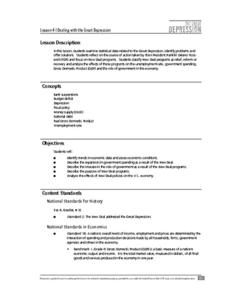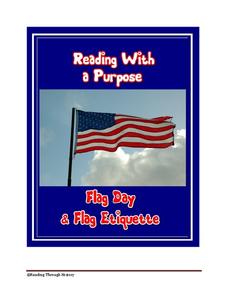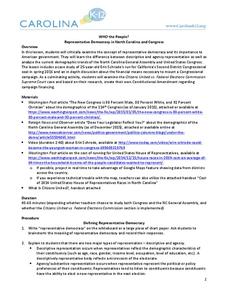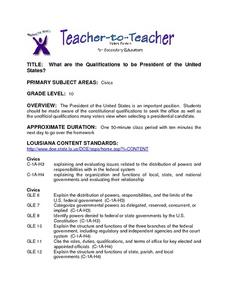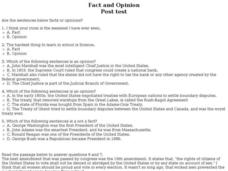Federal Reserve Bank
Dealing with the Great Depression
As part of their study of the Great Depression, young economists examine statistical data to determine the effectiveness of FDR's New Deal recovery programs.
Texas State Energy Conservation Office
Investigation: Blowing in the Wind
Using a simulated air sample, environmental or earth science pupils examine the components. You will need to prepare the faux air by using a hole punch and various colors of construction paper. Each color will represent a different...
Curated OER
Do Presidential Candidates Need to Be Good Debaters?
Blogs can be a good way for learners to engage in writing, critical thinking, and social media in a formal way. The New York Times has provided learners age 13-18 with an article, background information, and several prompts to get them...
Federal Reserve Bank
Measuring the Great Depression
Young historians examine the cost of goods and services through the Consumer Price Index (CPI), output measured by Gross Domestic Product (GDP), and unemployment measured by the unemployment rate to gain an understanding of the economic...
Reading Through History
Flag Day
Why is the United States flag such an important symbol to America that it gets its own day to celebrate it? Pupils read a passage that discusses the symbolism and significance of the American flag. Following the reading, they answer quiz...
Curated OER
Economics for Leaders Performance Assessment
Students participate in a scenerio in which they are assessed on the material in previous lessons. In groups, they prepare a presentation based on their solutions to the given problem. They develop their critical thinking skills applying...
Curated OER
Advising the President: A Simulated Cabinet Meeting
Students, as Cabinet members, "advise" the President on one current pressing problem or concern facing their department or post. They prepare an Action Plan with possible alternative courses of action that meets budget constraints.
Curated OER
World Statistic Day
Eleventh graders collect data about the state they live in. In this statistics lesson, 11th graders collect and analyze data as they compare themselves to students in other states. They analyze data about a person's education level, and...
Curated OER
Regulating Drugs: The Creation of the FDA
High schoolers view a video about the Food and Drug Administration. They research its history and functions. They examine problems facing society today. They compare and contrast these issues with those faced during the Progressive Era.
Curated OER
High-Definition Digital Television: Why Make the Switch?
In this digital television worksheet, high schoolers read about the advantages of using digital television. They answer three critical thinking questions about the advantages and disadvantage of digital television.
Curated OER
How Hazardous Substances Affect People
Students examine the health effects of hazardous waste on people. They work together to complete an experiment in which worms are exposed to chemicals. They discuss the results of the test.
Curated OER
Turning the Tide on Trash: Marine Debris Curriculum
Seven pages of fascinating reading on marine debris preface the activities in this lesson plan. Four different activities are employed to simulate how the debris is distributed in the ocean and along beaches. Early ecology learners...
Federal Reserve Bank
“Dewey Defeats Truman”: Be Aware of Data Revisions
Discover the impact and importance of data releases about current economic conditions in the United States. Your class members will learn about data revision and the GDP, and how these figures can alter people's views on the economy.
Center for Civic Education
What Does Returning to Fundamental Principles Mean?
Looking for materials for your Constitution Day and Citizenship Day lessons? Then check out this packet of activities that not only gets your class members thinking critically about the fundamental principles at the heart of American...
Curated OER
What is Meant by Returning to Fundamental Principles?
What did the Founding Fathers mean by the importance of continually returning to fundamental principles? Your young historians will analyze a series of quotations illustrating the fundamental ideals and principles of the United States...
Carolina K-12
Who the People? Representative Democracy in North Carolina and Congress
Our elected officials are supposed to represent us, but what does it mean when they aren't like us? Budding citizens explore the demographic makeup of the US Congress, the role of money in political elections, and the Citizens United...
Curated OER
Turning the Tide on Trash: Marine Debris Curriculum
Six different lessons comprise this unit on marine debris. Science, language arts, social studies, and art projects make this an ideal interdisciplinary unit. The result will be well-informed future citizens who can help make a...
University of California
Anti-Communism at Home
Have you ever been accused of something without cause? The sixth installment of an eight-part series asks scholars to create a museum exhibit on the anti-communist activities in the United States at the start of the Cold War. To make...
Judicial Learning Center
Law and the Rule of Law
We hear a lot about the importance of the rule of law, but most people do not really know what those words mean. The lesson is a webpage that defines the rule of law, explains why it is important in a democratic society and provides...
Curated OER
What are the Qualifications to be President of the United States?
Students research the qualifications necessary to be the president of the United States. They create a want-ad for this position using what they have learned about the qualifications.
Curated OER
Why Study Air Pollution?
Eighth graders study air pollution and identify some causes, effects and solutions. In this air pollution lesson students complete several activities.
Curated OER
Fact and Opinion Pre-Test
In this fact/opinion worksheet, students complete 10 multiple choice questions. Students may click on a link to view correct answers.
Curated OER
Fact and Opinion: Post Test
In this fact and opinion worksheet, students identify sentences as being facts or opinions or choose the fact or opinion sentence. Students complete 10 multiple choice questions.
Curated OER
Map Literacy
Students locate their home state on a map. They differentiate between physical and population sizes of states. In two groups, students "become" states with string for boundaries. They ascertain that area does not always equal large...


